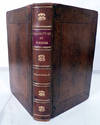

Sur la theorie generale des regulateurs. In: Comptes Rendus de l'Académie des Sciences de Paris, Vol. 83, 1876, p.318-320 [THEORY OF AUTOMATIC REGULATION; AUTOMATIC REGULATION; INFORMATION THEORY, Full Volume]
by Vyshnegradsky, Ivan Alekseevich [Wischnegradsky, I.] [Vyshnegradskii, I. A.]
- Used
- Hardcover
- first
- Condition
- See description
- Seller
-
West Branch, Iowa, United States
Payment Methods Accepted
About This Item
Paris: Gauthier-Villars, 1876. 1st Edition. In 1876 and working independently of Maxwell, Vyshnegradsky "developed stability criteria of steam engine governors" (Engineering Department University of Illinois). His work explained "the conditions of stability [and criteria] of a steam engine equipped with a direct-action centrifugal regulator" (DSB, XIV, 105-106). As well, Vyshnegradsky's work continues to be studied in the fields of cybernetics and information theory (more on this below).
Vyshnegradsky's "most significant scientific contributions were in the theory of automatic regulation. Before him, many scholars had studied the regulation of industrial processes, but the regulators that they developed were created experimentally and were not explained on a theoretical basis. Through his research Vyshnegradsky established the mathematical bases for the general scientific principles of automatic regulation. Prior to his work, the machine and the regulator had been examined individually, and only the statics of the regulator had been studied" (ibid).
"In modelling a steam engine with a centrifugal governor, Vyshnegradskii neglected Coulomb friction and linearised the system about an operating point...he investigated the conditions for the onset of 'hunting' (instability). Treating the engine as an integrator, and the governor as a second-order system, he made an ingenious change of variables [resulting in third-order characteristic equation that] lent itself... perfectly to a graphical technique of stability analysis" (Ptak; Classic Papers in Information Theory, the Open University).
In the fields of computer science, cybernetics, and information theory, as historians study the value of theoretical vs. practical applications and as cybernetics is increasingly discussed within the framework of "the science of control, communication and computation in machines and living tissues,"Vyshnegradsky's work continues to be scrutinized (Majumder, Cybernetics and General Systems - A Unitary Science).
"Without disparaging the merits of N. Wiener, C. Shannon, A. Turing, J. von Neumann, and their followers, it should be emphasized that some main provisions of management theories had previously been developed for many years, and some ideas even for centuries. Ideas of creating computers were proposed by B. Pascal and G. Leibniz in the 17th century. Ch. Babbage proposed a project of a universal programmable computer in 1833, which was a more developed prototype of modern computers. The theory of regulation by J. Maxwell and the theory of feedback systems by I. Vyshnegradsky began to be developed in the 1860s - 1870s. In the 20th century, their ideas were used in the theory of automatic management of production systems. At the same time, there were proposals to develop a general theory of management, but it still continues to be fully formed even today" (Denis, Development of communication science, computer science and cybernetics in the 1940s - 1950s, Hst Journal, 2019).
ALSO INCLUDED: Lelanche's Methode pratique pour experimenter un element de pile wherein he builds on his his invention of the Leclanché cell, one of the first modern electrical batteries and the forerunner of the modern dry cell, by jellifing the electrolyte of his cell, thus making it more portable.
ALSO: Normand's Sur la maladie dite diarrhee de Cochin-Chine. First recognition of Strongyloides stercoralis. To date, this remains highly significantly medically; it was especially important in understanding patients with HIV or other immunocompromised conditions. CONDITION & DETAILS: Full volume. Ex-libris bearing only a deaccessioned stamp on the back of the title page and slight ghosting at the spine where a spine level has been removed. 4to (275 x 200mm). [2], 1362, [2]. Bound in clean full blue cloth, gilt-lettered at the spine; ghosting from the removal of a label at the spine; stamp on the rear of the title page. Solidly. bound. Very occasional toning, otherwise clean and bright throughout. Very good condition.
Vyshnegradsky's "most significant scientific contributions were in the theory of automatic regulation. Before him, many scholars had studied the regulation of industrial processes, but the regulators that they developed were created experimentally and were not explained on a theoretical basis. Through his research Vyshnegradsky established the mathematical bases for the general scientific principles of automatic regulation. Prior to his work, the machine and the regulator had been examined individually, and only the statics of the regulator had been studied" (ibid).
"In modelling a steam engine with a centrifugal governor, Vyshnegradskii neglected Coulomb friction and linearised the system about an operating point...he investigated the conditions for the onset of 'hunting' (instability). Treating the engine as an integrator, and the governor as a second-order system, he made an ingenious change of variables [resulting in third-order characteristic equation that] lent itself... perfectly to a graphical technique of stability analysis" (Ptak; Classic Papers in Information Theory, the Open University).
In the fields of computer science, cybernetics, and information theory, as historians study the value of theoretical vs. practical applications and as cybernetics is increasingly discussed within the framework of "the science of control, communication and computation in machines and living tissues,"Vyshnegradsky's work continues to be scrutinized (Majumder, Cybernetics and General Systems - A Unitary Science).
"Without disparaging the merits of N. Wiener, C. Shannon, A. Turing, J. von Neumann, and their followers, it should be emphasized that some main provisions of management theories had previously been developed for many years, and some ideas even for centuries. Ideas of creating computers were proposed by B. Pascal and G. Leibniz in the 17th century. Ch. Babbage proposed a project of a universal programmable computer in 1833, which was a more developed prototype of modern computers. The theory of regulation by J. Maxwell and the theory of feedback systems by I. Vyshnegradsky began to be developed in the 1860s - 1870s. In the 20th century, their ideas were used in the theory of automatic management of production systems. At the same time, there were proposals to develop a general theory of management, but it still continues to be fully formed even today" (Denis, Development of communication science, computer science and cybernetics in the 1940s - 1950s, Hst Journal, 2019).
ALSO INCLUDED: Lelanche's Methode pratique pour experimenter un element de pile wherein he builds on his his invention of the Leclanché cell, one of the first modern electrical batteries and the forerunner of the modern dry cell, by jellifing the electrolyte of his cell, thus making it more portable.
ALSO: Normand's Sur la maladie dite diarrhee de Cochin-Chine. First recognition of Strongyloides stercoralis. To date, this remains highly significantly medically; it was especially important in understanding patients with HIV or other immunocompromised conditions. CONDITION & DETAILS: Full volume. Ex-libris bearing only a deaccessioned stamp on the back of the title page and slight ghosting at the spine where a spine level has been removed. 4to (275 x 200mm). [2], 1362, [2]. Bound in clean full blue cloth, gilt-lettered at the spine; ghosting from the removal of a label at the spine; stamp on the rear of the title page. Solidly. bound. Very occasional toning, otherwise clean and bright throughout. Very good condition.
Reviews
(Log in or Create an Account first!)
Details
- Bookseller
- Atticus Rare Books
(US)
- Bookseller's Inventory #
- 1591
- Title
- Sur la theorie generale des regulateurs. In: Comptes Rendus de l'Académie des Sciences de Paris, Vol. 83, 1876, p.318-320 [THEORY OF AUTOMATIC REGULATION; AUTOMATIC REGULATION; INFORMATION THEORY, Full Volume]
- Author
- Vyshnegradsky, Ivan Alekseevich [Wischnegradsky, I.] [Vyshnegradskii, I. A.]
- Book Condition
- Used
- Quantity Available
- 1
- Edition
- 1st Edition
- Binding
- Hardcover
- Publisher
- Gauthier-Villars
- Place of Publication
- Paris
- Date Published
- 1876
Terms of Sale
Atticus Rare Books
30 day return guarantee, with full refund including shipping costs for up to 30 days after delivery if an item arrives misdescribed or damaged.
About the Seller
Atticus Rare Books
Biblio member since 2010
West Branch, Iowa
About Atticus Rare Books
We specialize in rare and unusual antiquarian books in the sciences and the history of science. Additionally, we specialize in 20th century physics, mathematics, and astronomy.
Glossary
Some terminology that may be used in this description includes:
- Title Page
- A page at the front of a book which may contain the title of the book, any subtitles, the authors, contributors, editors, the...
- G
- Good describes the average used and worn book that has all pages or leaves present. Any defects must be noted. (as defined by AB...
- Spine
- The outer portion of a book which covers the actual binding. The spine usually faces outward when a book is placed on a shelf....
- Cloth
- "Cloth-bound" generally refers to a hardcover book with cloth covering the outside of the book covers. The cloth is stretched...

